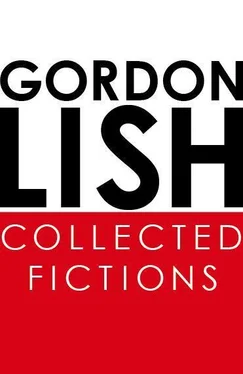Here is one of the famous ones.
Ravensbrück.
You probably heard of that one. Did you hear of that one?
I just told you — so now you heard of that one.
Not like Oswiecim.
Imagine having to say Oswiecim morning, noon, and night. This is probably why they didn't call it Oswiecim but called it Auschwitz, even though, hey, Auschwitz wasn't its real name.
But take my real name.
You know what I should do?
I should probably have a list for it.
WHAT IF THEY HAD A BARBER at Treblinka?
Or at Buchenwald?
Or at Dachau?
I have been thinking about this. I have been thinking about what if they had to have a barber to get off all of the hair off of them for when the women came in and the girls — get off all of their hair off everywhere — because didn't they do that, didn't they take off their hair off for something, didn't they take it all off of the girls off and the women off for some us-hating purpose?
So they must have had a person who did it. They must have had a person who cut off the hair off. It must have been a person who would be good at it and who would not get tired from doing it and who would know how to keep on doing it, to keep just cutting and cutting and not giving anybody who asked the wrong answers. Because look at how hard it would be for you to just keep doing it, you would have to be a one-hundred-percent professional — all of the girls coming in at you and taking their clothes off and all of the various and sundry women.
So what do you think about the question of who would be the person who did it?
You think it would be a job which they would give to what kind of a person?
Tell me which sex at least!
Tell me how old in years at least!
Tell me if this person should be a person who is short or who is tall, just as far as someone reaching!
BETWEEN 1938 AND 1944, I made regular visits in from Long Island to my father's place of business. It wasn't just my father's business. It was his business in business with his brothers. It was the business of making hats for girls and for women and then of getting places like Macy's and Gimbel's to buy them and make my father and his brothers rich. So I was telling you about between 1938 and 1944. Because I would come visit my father at my father's place of business and my father would show me around to all of his workers in all of the divisions and then my father would call up for his barber to come up for him to give me a haircut, and then a man would come up and would do it.
Then this is what my father would say.
"Now that they've cleaned you up, let's go out and put on the dog."
Then my father would give the man the money and take me out to a Longchamps for lunch and then, later on, take me over to DePinna's for something new, like for new leggings or for knickers to go with my new coat.
The money my father gave the barber, you know how he did it, gave him the money?
He slipped it to him.
My father slipped it to him.
You know, slipped it, palmed it, passed it off — a way the handler works the hand.
BIRKENAU.
Carthage.
Oz.
New York.
SHE SAID, "YOU WANT ME TO KISS IT and make it well? Come sit and I will kiss it and make it well. Come let me see it and I will kiss it and make it well. Just take your hand away from it and let me just look at it. I promise you, I am just going to look at it. Oh, grow up, could looking at it make it worse? Do us both a favor and let me look. I swear, all I am going to do is to look. So is this it? Are you telling me this is it? This can't be it. Are you sure this is it? You are not really telling me this is what all of this fuss is about. Is this what all of this fuss is about? I cannot believe that this is what all of this fuss is about. You have been making such a fuss about this? Don't tell me this is what you have been making all of this fuss about. You call this something? This is not something. This is nothing. You know what this is? I want to tell you what this is. This is nothing. Does it hurt? It doesn't hurt. It couldn't hurt. Why do you say it hurts? How could you say it hurts? You really want me to believe it hurts? Is this what you are telling me, you are telling me it hurts? Because I cannot believe that this is what you are telling me, that you are really telling me that a thing like this could possibly hurt. A little thing like this could not possibly hurt. Do us both a favor and don't tell me it hurts. So when I do this, does it hurt? What makes you say it hurts? Are you certain it hurts? How could it hurt? Give me one good reason why it should hurt. I should show you something that hurts. I am going to give you some advice. You want some advice? Count your lucky stars you don't have something that hurts. You know what you are doing? Let me tell you what you are doing. I want you to sit here and hear me tell you exactly what you are doing. Because guess what. You are making something out of nothing. You want me to tell you what you are doing? Because this is what you are doing — you are making something out of nothing. So don't act like you didn't know. You know what? You're not doing yourself any good when you put on an act like as if you didn't know. I am amazed at you, always putting on an act. So how come you never figured this out for yourself? You should have figured this out for yourself. Why should you, of all persons, not be the one to figure this out for yourself? I want you to promise me something — next time promise me you will figure things out for yourself.
"Forget it.
"I do not need anybody to promise me anything.
"Let me ask you something.
"No, better not, better skip it.
"The answer would make me sick.
"Listen, you know what is wrong with you? Because there is something very, very, very, very, very, very wrong with you. I guarantee you, I promise you — a person's mother, a mother knows."
BEHOLD THE INCREDIBLE REVENGE OF THE SHIFTED P.O.V
HOW SHALL WE SAY THE CLOCK WAS BOUGHT and paid for? For surely the seller's sticker on the thing declared a figure remarkably bolder than these youngsters could decently manage. But they were so keen, the two of them, so ungovernable in their zeal. Of what earthly pertinence was it that their purse could scarce stand up to the swollen demands of the humblest item in this shop? And the clock, oh my, as to its forbidding tariff, great heavens, this, please be clear, was certain to be seen by most shoppers as another, and much harsher, matter entirely. But what, please be, did other matters, certain or otherwise, have to do with anything when it was naught but the pressure of necessity itself that rested its infinite weight on the possessed hearts of these young people? For there the clock stood in its stony oaken case, all solemnity in its olden bearing (after all, the sticker stated "Early Nineteenth Century" no less legislatively than it stated the price) as it spoke its artful speech of sturdiness, of continuity, of permanence, offering to deliver these affiliations first and therefore, when the time was right, everything else.
It said it could confer on them as much.
Or so we heard it pledge its word to the new homemakers, and they heard it too.
"Wow, that's no joke!" the boy announced with some excessive gusto, meaning to exaggerate his astonishment not just for the good fun of making fun of himself but also to suggest to the shop's proprietor — who had hovered into position — that, in fact, for these two customers, the amount would be no large sum at all.
"But only think of it!" the girl exclaimed. "I mean, wouldn't it be like an heirloom really? I mean, when we have a family, couldn't we just sort of pass it on to them the way real people do, sort of like generations upon generations forever?"
Читать дальше











